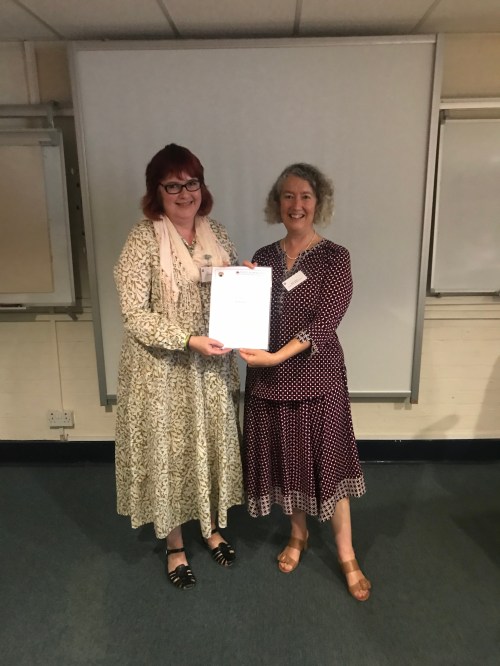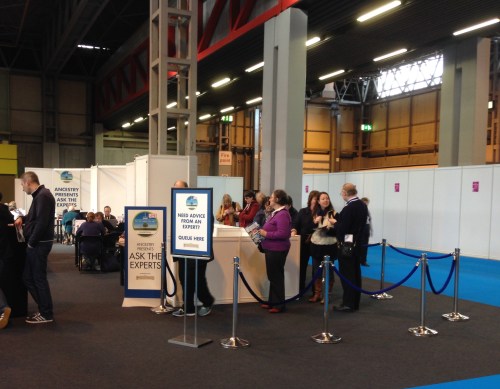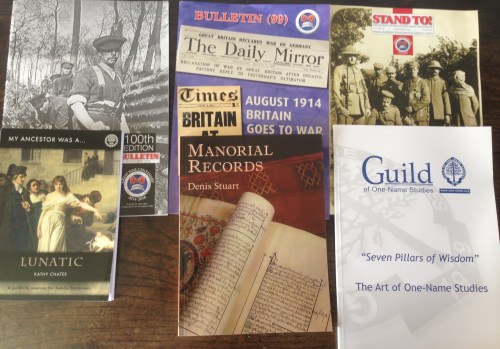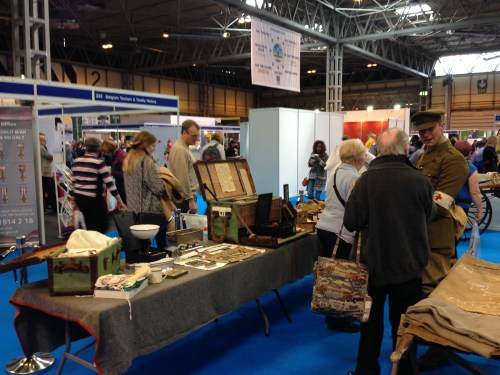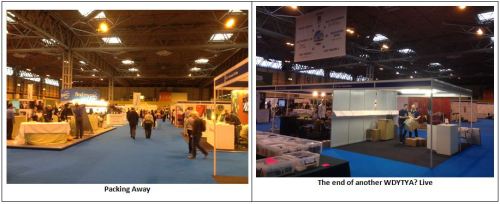I’m feeling a little lost. This is the time of year when my thoughts would be turning towards planning my ‘Who Do You Think You Are? Live’ adventure. But, as was announced last year, this is a show that won’t go on. Yes, the writing may have been on the wall with the massed ranks of so-called chuggers, aka charity muggers, in evidence last year. Stand space was expensive making it difficult for genuine family history organisations to have a presence. Even The National Archives gave it a miss. Is this a sign the popular interest in family history research has plateaued and is perhaps on the decline?

And, dare I say it, maybe the TV show ‘Who Do You Think You Are?’ has struggled occasionally with who it thinks it is in recent series. Yes, there are some gems of episodes. But it doesn’t seem to hold the same thrall of its early days. The BBC have also seemed happy to tinker with scheduling, to the detriment of viewing continuity, possibly an indication of where it now stands in their pecking order. No longer a flagship viewing offering? But is that in part because the format needs a shake-up?
Also has the series encouraged the belief family history is quick and easy? The big Internet and associated ‘it’s all a mouse-click away.com’ con, which in turn fostered the ‘fast-food family historian’ in us all to some extent. That attitude led to some of the more informative talks at last year’s ‘Live’ show, such as ones about genealogical proof, being a step too far for some of the audience. It’s too much like hard work, all this checking, corroborating and building a body of evidence.
I personally feel the absence of a national show has left a huge void in the British family history calendar of events. But maybe that’s because I’m a tad family history research obsessed. I’m going to miss its social aspect, the chance to see what’s out there beyond my own family history interests, the informative talks to improve my skill set, not to mention the opportunity to grab a book bargain or subscription discount. I’m seeking out alternatives, from the ‘Secret Lives’ conference to local and regional events and talks. One source to find out what’s on is GENEVA, an online calendar of GENealogical EVents and Activities.
On the same era-ending theme, earlier this month the final edition of ‘Your Family History’ magazine plopped on my doormat. Or should I say I dashed to the newsagent to buy my final copy, as my subscription expired the previous month and no reminder to renew was sent? For 15 years, initially under the title of ‘Your Family Tree’, it has provided information, advice and tips for the family history community from beginner to the more advanced. But time has been called on the publication. Reasons cited for its demise included rising costs and competition from the Internet. This competition presumably extends to digital media, blogs, podcasts and the like. But again I’m left wondering if the appetite for family history research has levelled out.
The family history landscape is changing. In reality it has always been a constant evolution. But the Internet is the real game-changer in recent years, considerably speeding up the process.
I started my family history journey probably just after the launch of ‘Your Family Tree’ (as it was called then). Back then it was old fashioned painstaking research methods. None of this ‘everything only a mouse click away’ belief, too often implicitly peddled by T.V. programmes and family history subscription sites now. Online subscription-based genealogy database services were in their infancy. IGI and FreeBMD were my high-tech, online ports of call. Microfiche and microfilm readers, Family History Societies and visits to local libraries and archives provided my gateway.
I well remember the days of going to my local library and scrolling through the census. Ditto for parish registers. I’d even plan holidays to visit archives in family associated locations in order to fit in a few hours research. This for basic record sets like the census or parish registers, things we take so much for granted today. Hard to imagine, but it wasn’t online and neither did it come automatically with a helpful searchable index. If you were lucky the local Family History Society might have compiled an index booklet. Or maybe an antiquarian publication had reproduced them. But, as the Family History Society exhorted, you still needed to check the original document.
But in the main you were ‘indexless’, and it was the long job of scrolling through filmed copies of the census, or going through the parish register microfiche by microfiche noting down all occurrences of family surnames. And maybe repeating the process, as research turned up a new surname to track in the same parish….several times over. But that way, you did get to familiarise yourself with the records, the community in which your ancestors lived and the writing!
It’s hard to imagine that this was how we did family history only a few years ago. Today, subscription genealogy services are in constant competition to get the next big dataset online. This is today’s gateway to family history. Yes, it is brilliant there is so much out there to tempt people into the wonderful world of family history. It’s making family history more accessible. And it can save masses of time in travelling up and down the country on archives visits. But in the race to get it all online, clear source referencing along with precise coverage dates, seems to have been dismissed. For instance the unwary may assume Ancestry’s West Yorkshire Parish Register collection includes all parishes. It doesn’t. But finding out what is there, and the years covered, is not an easy task. And transcribing errors may in turn lead to false negative results.
In a way it’s become too big, too unwieldy and the race to ‘chuck stuff online’ has meant it’s been too organisationally chaotic. For many there’s that initial flurry of interest, but it all tails off. And make no wonder people give up. It can be like plaiting fog. Especially when you don’t fully understand what’s there in the first place. I’ve heard people admit to it. They start off enthused but then they soon find it all too overwhelming and lose track (and interest) in what they’re doing.
In a way, the Internet may have curiously decreased knowledge too. There doesn’t seem to be the same willingness to trawl through a parish register, the Quarter Sessions or a Borough Court register to check for yourself. It’s too much like hard work. Yet there are times when this is necessary. For many it now needs to be the quick click, instant gratification of an online search and move on without evaluating whether it’s right or wrong. And hey presto I’ve got a tree going back to 1066!
A corollary is because so few are prepared to put in this painstaking work, the amount of time it takes is not appreciated. For so many there’s no interest in finding out about the variety of records, what they can and can’t do, what pitfalls there are, and what alternative sources exist to plug gaps. Which is why the demise of knowledge-bringing magazines such as ‘Your Family History’ is such a loss.
I’m forever seeking out information and knowledge to develop my family history skills: be it reading, both online and traditional books and magazines, as well as attending talks, webinars, podcasts and formal learning courses. I’m currently signed up to a series of Guild of One Name Studies monthly webinar. There are so many sources of learning out there if you look. And by doing them and improving your knowledge, you’ll be amazed how much you learn which in turn will lead to more accurate family trees, and hopefully breakthroughs. But that’s the point: you have to know the limitations of online sources and actively seek out knowledge beyond the confines of your computer. And by seeking out this wider knowledge you become more acutely aware of the computer pros and cons.
And yet there still seems to be only a passing realisation that not everything is on the internet. There is so much more in archives waiting to be explored. Much of it will never make it onto these online providers such as Ancestry, FindMyPast or The Genealogist because it is not commercially viable. Who for instance would be interested in churchwarden accounts, Vestry minutes, charity records, manorial documents and the like for some obscure location? But often these documents may help prove a link.
Bottom line, these companies are only interested in what makes money. After the 1921 census, what will they use to generate income and fresh interest? Perhaps this goes some way to explaining why price structures are amended; why Ancestry is putting its more recently acquired UK military datasets not on Ancestry.co.uk but on sister-company Fold3, in order to get another subscription stream; and why there is such a push on DNA testing as an alternative cash-cow. I’m not against DNA testing per se. It has a place. It is another tool. But there is perception peddled that it’s a quick root to a fully formed family tree, with no research required.
By the same token cash-strapped Councils, looking to make savings, are cutting back archives opening hours, or even closing them, because so much is online. Read the same for local libraries. It’s an easy excuse for them to use in order to reduce costs. And so it’s all online becomes a self-perpetuating myth.
Which is why I think David Olusoga’s recent BBC2 series ‘A House Through Time’ was such a refreshing change. Not only was it interesting, engaging and informative, it was a new way to introduce people to family history. It didn’t propagate the ‘it’s all online’ impression. And it wasn’t afraid to admit some people were difficult to trace and the trail went cold. Hopefully it has reached out to, and inspired, a new set of family historians, those seekers and keepers of documented, accurate ancestral truth, memories and knowledge.
